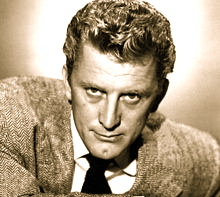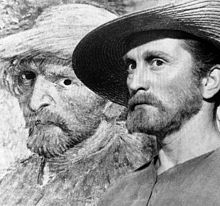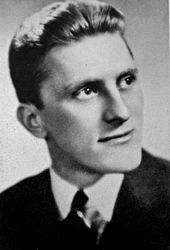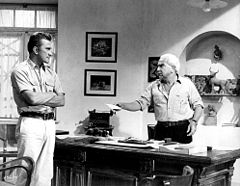Kirk Douglas


Douglas in c. 1950
Kirk Douglas (born Issur Danielovitch, Russian: И́сер Даниело́вич; December 9, 1916) is an American stage and film actor, film producer and author. His popular films include Out of the Past (1947), Champion (1949), Ace in the Hole (1951), The Bad and the Beautiful (1952), Lust for Life (1956), Paths of Glory (1957), Gunfight at the O.K. Corral (1957), The Vikings (1958), Spartacus (1960), and Lonely Are the Brave (1962).
He is No.17 on the American Film Institute‘s list of the greatest male American screen legends of all time, making him the highest-ranked living person on the list. In 1996, he received the Academy Honorary Award “for 50 years as a creative and moral force in the motion picture community.” He is one of the last surviving actors from Hollywood’s “golden age”.
Early life
Douglas was born Issur Danielovitch in Amsterdam, New York, the son of Bryna “Bertha” (née Sanglel) and Herschel “Harry” Danielovitch, a businessman. His parents were Jewish immigrants from Gomel, Belarus. His father’s brother, who emigrated earlier, used the surname Demsky, which Douglas’s family adopted in the United States. In addition to their surname, his parents also changed their given names to Harry and Bertha. Douglas grew up as Izzy Demsky and legally changed his name to Kirk Douglas before entering the Navy during World War II.
Coming from a poor family, as a boy Douglas sold snacks to mill workers to earn enough to buy milk and bread. Later, he delivered newspapers and worked at more than forty jobs before becoming an actor. He found living in a family of six sisters to be stifling, stating, “I was dying to get out. In a sense, it lit a fire under me.” During high school, he acted in school plays, and discovered “The one thing in my life that I always knew, that was always constant, was that I wanted to be an actor.”
Unable to afford tuition, Douglas talked his way into St. Lawrence University and received a loan which he paid back by working part-time as a gardener and a janitor. He was a standout on the wrestling team, and wrestled one summer in a carnival to make money.
Douglas’ acting talents were noticed at the American Academy of Dramatic Arts in New York City and he received a special scholarship. One of his classmates was Betty Joan Perske (later to become better known as Lauren Bacall), who would play an important role in launching his film career. Another classmate was aspiring Bermudian actress Diana Dill. While doing summer stock theater during a college term break, he began using the name Kirk Douglas, which he later legally adopted. He earned his first money as an actor that summer. Upon graduating from drama school, Douglas made his Broadway debut as a singing telegraph boy in Spring Again.
Douglas enlisted in the United States Navy in 1941, shortly after the United States entered World War II. He was medically discharged for war injuries in 1944. On May 3, 1943, Diana Dill, his former classmate, appeared on the cover of Life magazine. Seeing the photograph, Douglas told his fellow sailors that he was going to marry her. He did on November 2, 1943. The couple had two sons together (Michael in 1944 and Joel in 1947) before they divorced in 1951.
After the war, Douglas returned to New York City and found work in radio, theatre, and commercials. His stage break occurred in Kiss and Tell, which led to other roles. Douglas had planned to remain a stage actor but Lauren Bacall helped him get his first screen role in the Hal B. Wallis film The Strange Love of Martha Ivers (1946), starring Barbara Stanwyck. Wallis was on his way to New York to look for new talent when Bacall suggested he visit Douglas, who was rehearsing a play called The Wind Is Ninety. Douglas finished the play’s run and, with no follow-up work in sight, headed to Hollywood. He was immediately cast in one of the leading roles in Wallis’ film and made his film acting debut as a weak man dominated by a ruthless woman, unlike his later roles where he often played dominating characters.
Career
Douglas established his image as a tough guy in his eighth film, Champion, playing a selfish boxer. From then on, he made a career of playing “sons of bitches.” From that film on, he decided that to succeed as a star, he needed to ramp up his intensity, overcome his natural shyness, and choose stronger roles. He later stated, “I don’t think I’d be much of an actor without vanity. And I’m not interested in being a ‘modest actor’.” Early in his Hollywood career, he demonstrated his independent streak and broke his studio contracts to gain total control over his projects, forming his own movie company “Bryna Productions”, named after his mother.
Douglas made his Broadway debut in 1949 in the Anton Chekhov play “The Three Sisters,” produced by Katharine Cornell.
Douglas was a major box office star in the 1950s and 1960s, playing opposite some of the leading actresses of that era. Among his various roles, he played a frontier peace officer in his first western Along the Great Divide (1951). He quickly became comfortable with riding horses and playing gunslingers, and appeared in many westerns. In Lonely Are the Brave (1962), his own favorite of his performances, Douglas plays a cowboy trying to live by his own code, much as he did in real life.
In The Bad and the Beautiful (1952), one of his three Oscar-nominated roles, Douglas plays Jonathan Shields, a hard-nosed film producer who manipulates and uses his actors, writers, and directors. In Young Man with a Horn (1950), Douglas portrays the rise and fall of a driven jazz musician, based on real-life horn player Bix Beiderbecke. Composer-pianist Hoagy Carmichael, playing the sidekick role, added realism to the film and gave Douglas insight into the role, being a friend of the real Beiderbecke.
In one of his early television appearances, Douglas was a musical guest (as himself) on The Jack Benny Program. In the opening monologue, Benny reads the reviews of critics who liked his season premiere, while skipping the ones who did not. He then hurries home for his weekly jam session with Tony Martin (on clarinet), Fred MacMurray (saxophone), Dick Powell(trumpet), Dan Dailey (drums), and Douglas (four-string banjo). They avail themselves of the coin-operated vending machines in Benny’s living room. The band plays Basin Street (Blues), but Douglas keeps going into Bye Bye Blues, the only song he knows.
 In Lust for Life as Vincent Van Gogh
In Lust for Life as Vincent Van Gogh
Douglas played many military men, with varying nuance, in Top Secret Affair (1957), Paths of Glory (1957) (his most famous role in that genre), Town Without Pity (1961), The Hook (1963),Seven Days in May (1964), Heroes of Telemark (1965), In Harm’s Way (1965), Cast a Giant Shadow (1966), Is Paris Burning (1966), and The Final Countdown (1980).
His role as Vincent Van Gogh in Lust for Life (1956), filmed mostly on location in France, was noted not only for the veracity of his appearance but also for how he conveyed the painter’s internal turmoil. He won a Golden Globe award for his role. Director Vincente Minnelli stated, “Kirk Douglas achieved a moving and memorable portrait of the artist—a man of massive creative power, triggered by severe emotional stress, the fear and horror of madness. In my opinion, Kirk should have won the Academy Award.” Douglas himself called his acting role as Van Gogh a “very painful experience.” He writes, “Not only did I look like Van Gogh, I was the same age he was when he committed suicide.”
Douglas played the lead with an all-star cast in Spartacus (1960). He was the executive producer as well, raising the $12 million production cost. He also played an important role in breaking the Hollywood blacklist by making sure that Dalton Trumbo‘s name was mentioned in the opening and ending credits of the film for the outstanding screenplay he did for the film. Douglas initially selected Anthony Mann to direct the movie, but dismissed him when he judged the initial shooting to be unsatisfactory. To replace Mann he chose Stanley Kubrick, who three years earlier had collaborated closely with Douglas in Paths of Glory, where Douglas played one of his most notable roles as Colonel Dax, the commander of a French regiment during World War I. Spartacus was a huge success, but Kubrick, considering himself a mere employee of Douglas and since much of the footage (including Peter Ustinov‘s key scenes) was shot under Mann, did not consider it to be part of his own oeuvre.
In addition to serious, driven characters, Douglas was adept at roles requiring a comic touch, as in 20,000 Leagues Under the Sea (1954), an adaptation of the Jules Verne novel, wherein he plays a happy-go-lucky sailor who is the opposite in every way of the brooding Captain Nemo (James Mason). The film was one of Walt Disney‘s most successful live-action movies and a major box-office hit. He manages a similar comic turn in the western Man Without a Star (1955) and in For Love or Money (1963).
Douglas made seven films over the decades with Burt Lancaster; I Walk Alone (1948), Gunfight at the O.K. Corral (1957), The Devil’s Disciple (1959), The List of Adrian Messenger (1963), Seven Days in May (1964), Victory at Entebbe (1976) and Tough Guys (1986), which fixed the notion of the pair as something of a team in the public imagination. Douglas was always second-billed under Lancaster in these movies but, with the exception of I Walk Alone, in which Douglas played a villain, and The List of Adrian Messenger, in which Lancaster played a brief part in disguise, their roles were more or less the same size. Both actors arrived in Hollywood at the same time, and first appeared together in the fourth film for each. They both became actor-producers who sought out independent Hollywood careers.




